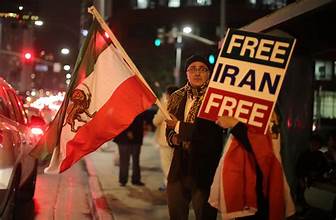Missile Strike:
An Iranian missile targeting northern Iraq has triggered a dispute between the two. The Iran-Iraq attack also fuels regional instability. To record protest Baghdad has called its ambassador back. Tehran insisted that the attack aimed to deter threats from Israeli spies.
Iranian Revolutionary Guards targeted an Israeli espionage center in Iraq’s Kurdistan region. The elite force, known as the Revolutionary Guards, claimed responsibility for the strike. They also reported of conducting strikes in Syria against the Islamic State.
Worsening Instability:
The recent strike is likely to fuel regional instability in the Middle East. The ongoing war between Israel and Hamas has also contributed to fueling regional instability. Involvement of Iran allies such as Lebanon, Syria, Iraq, and Yemen also fuels regional instability.
There are threats of Iraq becoming a battleground for regional conflict. The apprehension arises from a series of U.S. strikes targeting Iran-linked militant groups. These groups are integrated into Iraq’s formal security forces.
Iranian Revolutionary Guards Stance:
The responsibility of the Monday attacks was claimed by the Guards. They claim that the strike was linked to Israel atrocities in Gaza war and throughout Middle East since Oct 7 attack
Iraq Official Stance:
Iraqi Prime Minister Mohammed Shia al-Sudani condemned the attack on Erbil as “clear aggression” against Iraq. He called it a dangerous development that undermined the strong relationship between Tehran and Baghdad. Such attempts are going to fuel regional instability.Al-Sudani stated that Iraq reserved the right to take legal and diplomatic measures granted by its sovereignty.
In response to the incident, Iraq recalled its envoy from Tehran and summoned Iran’s charge d’affaires in Baghdad.
Casualties and Denial of Allegations:
The strike, near the U.S. consulate in Erbil, led to the death of at least four civilians and injured six. Iraqi Kurdish Prime Minister Masrour Barzani described it as a “crime against the Kurdish people.”
Other casualties included multimillionaire Kurdish businessman Peshraw Dizayee and several family members. They were killed by a rocket strike. This was confirmed by Iraqi security and medical sources. Iraq National Security Adviser Qasim al-Araji denied allegations that the targeted house was an Israeli spy centre.
Qasim Al- Araji t old reporters, “To respond to the claim that there is a Mossad headquarters we visited the place and toured every corner of this house, and everything indicates that it is a family house belonging to an Iraqi businessman from Erbil.
‘RECKLESS’
Israeli government spokesperson Avi Hayman refrained from speculating on Iran’s claim of striking a Mossad site during a press briefing. Instead, he emphasized that Iran persistently uses proxies to attack Israel on various fronts. Hayman condemned Iran’s activities and urged the international community to stand up against Iran while advocating for peace in the region.
Iran’s Defense and Missile Launch in Syria:
Iranian Foreign Ministry spokesman Nasser Kanaani defended the attack. He ensured that Tehran respects the sovereignty and territorial integrity of other nations. He stated that it was Iran’s “legitimate right” to deter national security threats.
In addition to the Erbil strike, the Guards announced that they launched ballistic missiles in Syria. They claimed to have destroyed “perpetrators of terrorist operations” in Iran, including the Islamic State.
Islamic State claimed responsibility for two explosions in Iran this month. These explosions resulted in nearly 100 deaths and numerous injuries. France accused Iran of violating Iraq’s sovereignty. Washington condemned the attacks as “reckless,” clarifying that no U.S. facilities were affected, and there were no U.S. casualties.
Background and Regional Dynamics:
Iran, a supporter of Hamas in its conflict with Israel, accuses the U.S. of backing what it terms “Israeli crimes” in Gaza. While the U.S. supports Israel, it has expressed concerns about the civilian casualties in Palestinian territories. Iran has previously conducted strikes in Iraq’s Kurdistan region, citing it as a staging ground for Iranian separatist groups and agents of its arch-foe Israel. In 2023, Baghdad took steps to address Iranian concerns by relocating some members of separatist groups as part of a security agreement reached with Tehran.
















